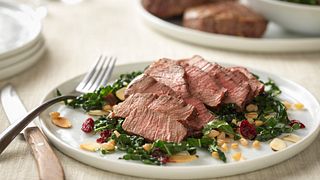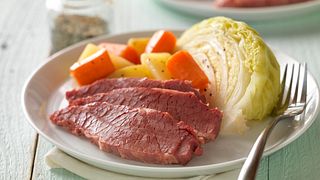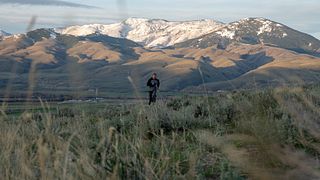Dr. Mike Roussell
Dr. Mike Roussell, PhD, and author of Strength: The Field Manual, is on the forefront of nutrition research and communication to offer strategies on living an active and healthy lifestyle.
Dr. Mike Roussell, PhD, offers strategies on living an active and healthy lifestyle.
Dr. Mike Roussell, PhD, is on the forefront of nutrition research and communications. Given his academic background and consulting experience, he has a unique ability to translate scientific research into relevant, understandable and actionable strategies that get results. Dr. Roussell holds a degree in biochemistry from Hobart College and a doctorate in nutrition from Pennsylvania State University. He has been published in top health and fitness publications including Men’s Health, Muscle & Fitness, Women’s Health, USA Today and Health Magazine.
Q&A with Dr. Mike Roussell:
How does beef play a role in an active lifestyle?
Beef plays a foundational role in my personal nutrition to support my lifestyle. My PhD research centered on exploring the role of beef in a heart healthy diet and since then I have developed an even greater appreciation for the overall nutrient package (i.e. the combination of all the nutrients in a food) that beef provides in my diet beyond just the protein and key amino acids. Nutrients like iron, B-vitamins, zinc, and selenium found in beef help support a strong mind, body, and immune system. Beef is a key food in my daily diet.
To you, what is the definition of strength?
As I mentioned at the beginning of the Strength: The Field Manual, I used to just define strength as physical/muscular strength. But I now see strength as much more than that. Physical strength is important, but so is mental strength, and strong relationships to support our emotional strength and wellbeing. Food plays into all those things. Our diet impacts our ability to perform and recover from exercise. The nutrients in our diet impact our brain function. How we use the time for preparing and eating meals with friends and family can also enrich our lives and wellbeing. I think these are all connected for creating a strong life.
What is the most important thing you tell your clients to live a healthy, active lifestyle?
We need a long-term strategy. Anyone can grit and bear the pain of a bland restricted diet filled with foods they don’t enjoy for 4 or 8 weeks, but health is not an 8-week journey. I work with clients to keep them healthy for their entire life. This means finding ways to prepare and eat meals that they enjoy – which also fuel their body and support good health. It means finding sports and activities that they look forward to doing and not just do because “exercise is good for them.” So many people are focused on short term gains at the expense of long-term progress, but I am always talking to my clients about our long-term plans for their health and wellness.
What is the importance of food in a healthy lifestyle?
Food is the most important thing when it comes to a healthy lifestyle. Food provides you with the energy to do the things you want to do and the nutrients that your body needs to be at its best. Food impacts your ability to recover from exercise, the quality of your sleep, your ability to focus and think, and even the health of your skin. I don’t think you can have good health without a good diet.
What are some of the biggest challenges people face in living a healthy lifestyle and how do you solve those challenges?
I half-joke with my clients that the world is out to have them eat more and move less so we need to be proactive about our health and the decisions we make around food and activity - I call this the “friction of healthy living.” Eating well and being active creates friction with people’s everyday lives that are full of family, work, and social commitments. When we are tired and stressed our willpower wanes, making it harder to make the “right decision” vs. the easy decision when it comes to our diets.
The simplest solution to this is planning. Planning allows you to remove the decision making from the moment. Planning allows you to reduce the friction of healthy living from your life. It doesn’t need to be elaborate planning either. Simple things like packing your lunch the night before so it is ready to go in the morning or always having sneakers in your car, so you can always go for a run or a walk. Having conversations with friends and family about the changes that you are trying to make in your life so that you are healthier is another great way to remove the friction of healthy living as we generally don’t think of the social constraints on improving our diets and being more active. Always work to be proactive about your health and not reactive. That will serve you best in the long run.
How important is protein’s role in an active lifestyle?
In the Strength: The Field Manual the first cornerstone of a healthy diet is to anchor your plate with protein – essentially this means to ensure that when you have a meal, protein is a key/mandatory component. I made this the first cornerstone because of how important protein is to a healthy diet and active lifestyle. When we are physically active that causes our muscles to breakdown. We need to build them back up and repair them so that they can be ready to go, stronger, the next time we exercise. Protein is essential for this recovery process. Protein also works in our body via a variety of different ways to control our appetites and body weight which can further drive our active lifestyles.





